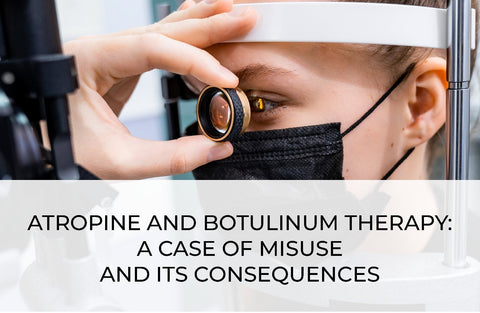ATROPINE AND BOTULINUM THERAPY: A CASE OF MISUSE AND ITS CONSEQUENCES

In modern cosmetic dermatology and aesthetic medicine, botulinum toxin type A (BTA) injections are widely used to correct expression lines. However, like any medical intervention, this procedure can have side effects. One rare but potentially serious complication is the development of diplopia (double vision) caused by paralysis of one or more eye muscles.
In the clinical case described in the article by Hagan J.C., a 46-year-old woman visited an ophthalmologist complaining of double vision and dilated pupils. A few days earlier, she had undergone BTA injections into the outer corners of her eyes ("hound's feet") at a cosmetic clinic that was not a specialized ophthalmology facility. The injections were administered by a medical worker not specialized in this field.
Four to five days after the injections, the woman developed diplopia, more pronounced when looking away and to the side. When she returned to the clinic, she complained of double vision. After examination, she was given atropine drops in both eyes without explanation. Within an hour after the injection, the pupils became even more significant and unresponsive to light, and the woman completely lost her ability to read.
She went to the article's author (an ophthalmologist) on the same day. On examination, she was found to have twitching of both lateral rectus muscles of the eye (responsible for moving the eye to the side), fixed pupils with a diameter of 5 mm, and decreased near visual acuity. The rest of the eye examination findings were normal.
The physician contacted the clinic where the botulinum toxin injections were performed. Still, the staff refused to identify the physician who had prescribed the atropine drops, explain their use, or explain why they were available at the clinic.
Diagnosis: paralysis of the lateral rectus muscles of the eyes caused by botulinum toxin injections and iatrogenic mydriasis (pupil dilation), and accommodation paralysis due to incorrect application of atropine. It was explained to the patient that her vision could take several months to recover and that her pupils could return to normal in a month. This was the case, but during this time, the patient suffered significant discomfort due to limited vision.
This case demonstrates several important aspects:
- Risks of unqualified botulinum toxin administration. Botulinum toxin injection procedures should be performed by experienced professionals who are qualified and knowledgeable about possible complications. Improper injection technique or the use of inappropriate medications can lead to undesirable consequences such as paralysis of the eye muscles and diplopia.
- Misuse of atropine. Atropine is a powerful mydriatic (pupil dilator) and cycloplegic (accommodation paralyzer). Its use in this case was unwarranted and worsened the patient's condition by causing additional side effects. Atropine is not a treatment for diplopia caused by botulinum toxin.
- The importance of timely consultation with an ophthalmologist. If any complications occur after botulinum toxin injections, you should immediately consult an ophthalmologist for diagnosis and treatment. Self-treatment in such cases is extremely dangerous and can lead to irreversible consequences.
The author particularly emphasizes the lack of scientific justification for using atropine in this case and urges caution in using mydriatics and cycloplegics.
The case described in this article is a good example of how important it is to seek the advice of qualified professionals and how inappropriate actions can worsen the situation. Such procedures should be carried out in the context of good medical practice and compliance with all necessary safety measures and professional standards.
References
Hagan J.C. 3rd. Atropine eye drops inappropriately used for diplopia following cosmetic botulinum a toxin injections. Mo Med. 2020; 117(1): 73–75.



































